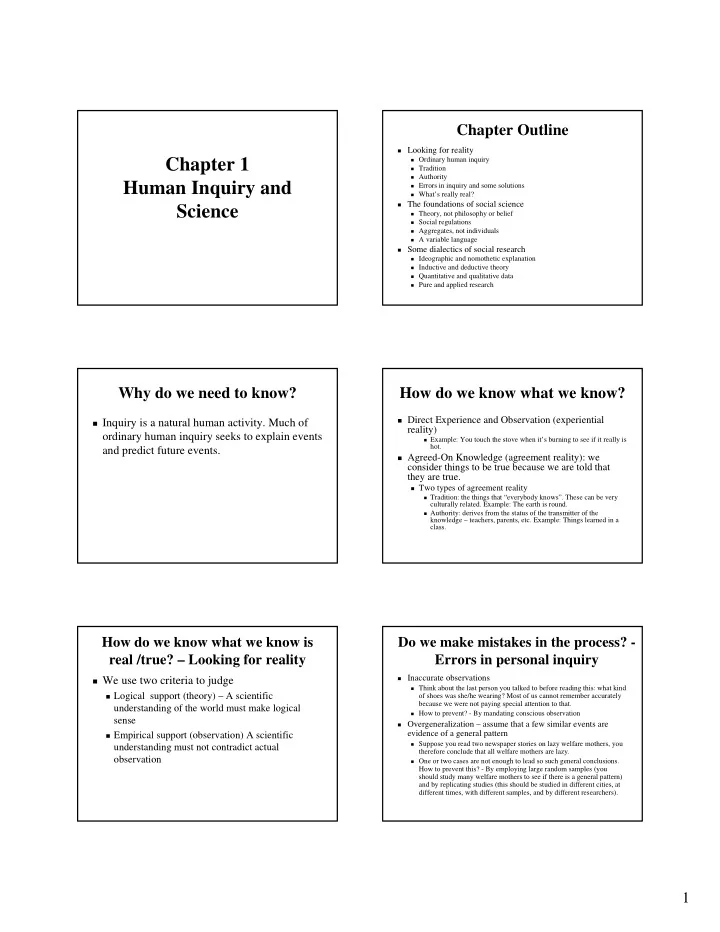

Chapter Outline Chapter Outline � Looking for reality Looking for reality � Chapter 1 � Ordinary human inquiry Ordinary human inquiry Chapter 1 � � Tradition Tradition � � Authority Authority � Human Inquiry and Human Inquiry and � Errors in inquiry and some solutions Errors in inquiry and some solutions � � What’s really real? What’s really real? � � The foundations of social science The foundations of social science � Science Science � Theory, not philosophy or belief Theory, not philosophy or belief � � Social regulations Social regulations � � Aggregates, not individuals Aggregates, not individuals � � A variable language A variable language � � Some dialectics of social research Some dialectics of social research � � Ideographic and nomothetic explanation Ideographic and nomothetic explanation � � Inductive and deductive theory Inductive and deductive theory � � Quantitative and qualitative data Quantitative and qualitative data � � Pure and applied research Pure and applied research � Why do we need to know? How do we know what we know? Why do we need to know? How do we know what we know? � Direct Experience and Observation (experiential Direct Experience and Observation (experiential � � Inquiry is a natural human activity. Much of Inquiry is a natural human activity. Much of � reality) reality) ordinary human inquiry seeks to explain events ordinary human inquiry seeks to explain events � Example: You touch the stove when it’s burning to see if it real Example: You touch the stove when it’s burning to see if it really is ly is � hot. hot. and predict future events. and predict future events. � Agreed Agreed- -On Knowledge (agreement reality): we On Knowledge (agreement reality): we � consider things to be true because we are told that consider things to be true because we are told that they are true. they are true. � Two types of agreement reality Two types of agreement reality � � Tradition: the things that “everybody knows”. These can be very Tradition: the things that “everybody knows”. These can be very � culturally related. Example: The earth is round. culturally related. Example: The earth is round. � Authority: derives from the status of the transmitter of the Authority: derives from the status of the transmitter of the � knowledge – knowledge – teachers, parents, etc. Example: Things learned in a teachers, parents, etc. Example: Things learned in a class. class. How do we know what we know is How do we know what we know is Do we make mistakes in the process? - Do we make mistakes in the process? - real /true? – real /true? – Looking for reality Looking for reality Errors in personal inquiry Errors in personal inquiry � Inaccurate observations Inaccurate observations � We use two criteria to judge We use two criteria to judge � � � Think about the last person you talked to before reading this: w Think about the last person you talked to before reading this: what kind hat kind � � Logical support (theory) Logical support (theory) – – A scientific A scientific � of shoes was she/he wearing? Most of us cannot remember accurately of shoes was she/he wearing? Most of us cannot remember accurate ly because we were not paying special attention to that. because we were not paying special attention to that. understanding of the world must make logical understanding of the world must make logical � How to prevent? How to prevent? - - By mandating conscious observation By mandating conscious observation � sense sense � Overgeneralization Overgeneralization – – assume that a few similar events are assume that a few similar events are � evidence of a general pattern evidence of a general pattern � Empirical support (observation) A scientific Empirical support (observation) A scientific � � Suppose you read two newspaper stories on lazy welfare mothers, Suppose you read two newspaper stories on lazy welfare mothers, you you � understanding must not contradict actual understanding must not contradict actual therefore conclude that all welfare mothers are lazy. therefore conclude that all welfare mothers are lazy. observation observation � One or two cases are not enough to lead so such general conclusi One or two cases are not enough to lead so such general conclusions. ons. � How to prevent this? How to prevent this? - - By employing large random samples (you By employing large random samples (you should study many welfare mothers to see if there is a general pattern) attern) should study many welfare mothers to see if there is a general p and by replicating studies (this should be studied in different cities, at and by replicating studies (this should be studied in different cities, at different times, with different samples, and by different researchers). different times, with different samples, and by different resear chers). 1
Recommend
More recommend